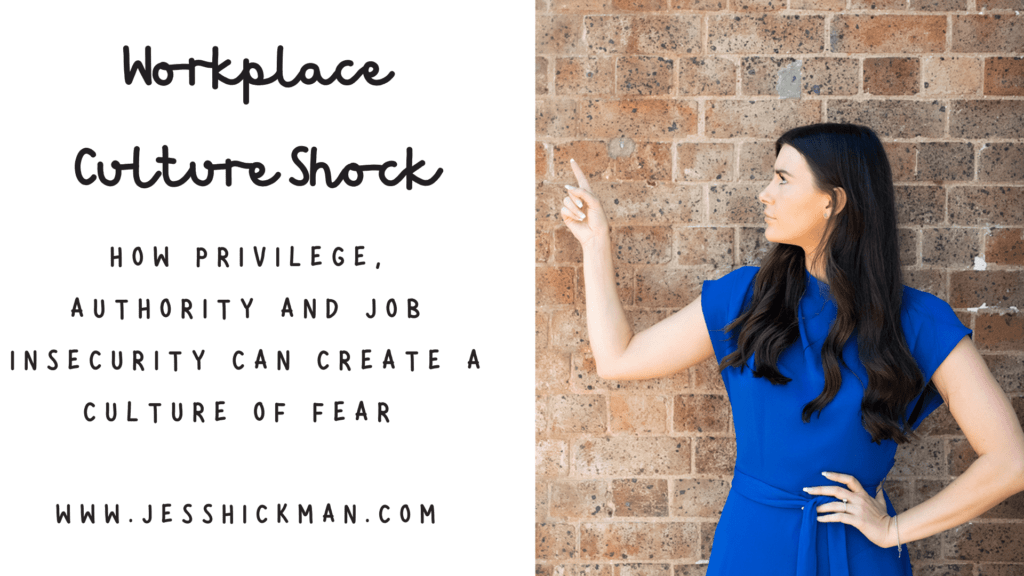Blog
Workplace Culture Shock

How privilege, authority and job insecurity can create a culture of fear
Recent sexual assault allegations by several women employed in and around the Parliament House in Canberra left many people experiencing workplace culture shock. Most importantly, it raised valid questions about its workplace culture.
Politics is a game of power. Sexual harassment and bullying thrive in environments with unhealthy power imbalances, inadequate reporting processes, poorly enforced codes of conduct, and the fear that speaking out might affect job security.
However, since this story is still unfolding, it would be wise to reserve our final judgement until all the facts are in. It’s also important to remember that negative workplace climates aren’t just an issue in our halls of political power.
Employee harassment in all its forms (bullying, cyber aggression, racism, intimidation, etc.) is everywhere. It just rarely makes it onto the front pages of our newspapers.
I know this from firsthand experience. Years ago, I endured prolonged workplace bullying at the hands of my immediate manager while working in the resources industry in the Northern Territory. This included physical and emotional intimidation, threats, misogyny, harassment and verbal abuse.
I filed over 30 complaints against my bully, but nothing was done to put a stop to his behaviour. Placating promises and ‘passing the buck’ were all I could expect from upper management.
This experience, and the lessons learned from it, led me to create a business dedicated to educating global business leaders on the crucial need to create and maintain positive, supportive workplace cultures.
Unsafe workplaces aren’t created in an instant, and the blame rarely falls on a single individual.
Nearly 40% of women and more than a quarter of men have experienced sexual harassment in the Australian workplace in the past five years.
Injustice and criminal victimization can occur wherever fear, mistrust and power imbalances are allowed to supersede empathy, accountability and clearly defined expectations of conduct.
Brittany Higgins and the other women who have come forward with their statements should be applauded for their extraordinary courage. It is truly a lonely place to be in, where you feel you have no one to turn to for help. Your decisions are also constantly tainted by a dark cloud of fear.
I’ve been there myself. It took a stress-induced stay in hospital for me to realize that my toxic work environment was harming my mental and physical health. I left my position shortly thereafter.
No one in any workplace should ever feel, as Brittany did, that they must choose between pursuing an investigation or their chosen career.
Though the Canberra workplace culture left many in shock, the high-profile nature of the situation provides us with a valuable opportunity. We now have a chance to look much more closely at the core reasons why such horrific incidents occur and how they might be prevented.
Trust shouldn’t be a workplace luxury. Instead, it should be the foundation upon which all business culture is built.
Safety in the workplace is only possible when protocols are put in place to ensure any problems are dealt with immediately, firmly, and with an appropriate level of support and trust.
A positive work environment takes a team effort, fueled by confidence, bolstered by education and training, nurtured with support and kept in check by processes that everyone understands and everyone takes responsibility for.
One of the most vital ingredients in creating a thriving workplace is the development and encouragement of ‘upstanders’. An upstander is a helpful bystander. Someone who stands up, speaks out, and takes action when they see something wrong. Whether it’s happening in a workplace, school, sporting environment or online.
Upstanders are unsung heroes. Research shows they are also the single most important factor in reducing bullying, harassment and other unacceptable behaviours.
An upstander can be an employee, a manager, a CEO, or an office cleaner. Their common trait is a determination to always take a stand and do the right thing whenever they see (or learn of) injustice.
Unfortunately, Parliament, like so many work environments, appears to have suffered from a shortage of upstanders.
Bullies and sexual predators thrive in environments where leadership failure breeds a code of silence.
Indeed, businesses need better training on how to nurture healthy, safe work environments. However, there’s also a case to be made for expanding sexual consent education in schools.
Legal definitions of sexual consent and sexual assault are still poorly understood by many young people today. Part of the reason is that sex education in schools is still an uncomfortable subject for many teachers, administrators, and parents.
I recently read a confronting article detailing how hundreds of female students at Sydney private schools claim to have been sexually assaulted. What’s more, around 1500 female students have signed a petition calling for better sexual consent education.
Some of the schoolgirls were as young as 13 when it happened. Many did not even understand they had been raped until well after the incidents occurred.
This highlights just how much work we have to do to educate our youth (both male and female) about the legal and moral implications of the subject.
Toxic work environments lose money, shed valuable staff and destroy company reputations. There’s no upside.
The recent events in Canberra have shone a powerful light on personal and professional responsibility, workplace accountability, trust, job insecurity, communication, and the terrible consequences of allowing a fearful work environment to flourish.
Fear stifles communication. In contrast, free communication backed up by genuine support is a proven antidote to the worst of workplace horrors. Properly addressing one assault incident would almost certainly have helped prevent more from occurring.
While the Canberra situation will undoubtedly be used as a political football and provide ample ammunition in the blame game, we need to accept that this is a widespread societal problem, and we all share some collective responsibility for it.
To have an alleged sexual assault happen just metres from the Prime Minister’s office should indeed shock us all. Then again, it also serves as a wake-up call.
Undeniably, it is not enough to be outraged by the problem. We need to finally buckle down and get serious about finding a solution.
If you’d like to talk more about moving to a thriving workplace culture, find out how to arrange an Upstander Training at your business or book Jessica to deliver a compelling keynote, please contact Jessica Hickman at jessica@jesshickman.com.

